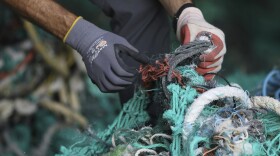The number of tourists coming to Hawai'i has grown in the past three decades, but their spending in real dollars has remained the same. While visitors make up the state's major industry, their presence adds to the wear and tear on the roads, parks and trails, and there's often no charge for their use.
So what to do?
The City Council's business, economic development and tourism committee last week turned to economist Paul Brewbaker for his take on the problem.
Brewbaker has been ringing the bell for years that the state is earning less per visitor, even though the tourism count has skyrocketed.

"This idea that tourism receipts have not grown while the number of people or the number of days they occupy the islands have grown is problematic because all of the social costs associated with tourism are or are primarily associated with their physical presence," Brewbaker said.
Sharing the beach and trails with tourists is fine, he said, until the point of congestion is reached. The City and County of Honolulu is especially hard-hit by this problem.
On O'ahu, the visitor count was declining from the peak of the Japan Bubble in the late 1990s, Brewbaker said. The state and tourism industry created programs to boost the visitor count and in the past two decades, tourism renewed itself, driven by Asia visitors.
If we charge a zero price for access, guarans, we're not going to have enough fiscal resources to manage the bathroom at the public park or the roadways or the reason the trail brought everyone here in the first place. -- Economist Paul Brewbaker
But since 2009, although O'ahu's visitor count has doubled, visitor spending stopped growing seven years ago, he said. Factors like the decline of the Japanese yen, which makes it more expensive to pay for visits, explain in part why tourists spend less. Another reason: more amd more visitors are repeaters and they get smarter about how to save money while they're here.
"The long-term downward trend, I think, you can't really lean against," according to Brewbaker.
The one area where visitor receipts have gone up over 30 years is in hotel lodging, he said, suggesting everything else has been declining. His takeaway is that if someone wants to make a killing in tourism, lodging is the place to be.
Short-term rentals
Brewbaker showed a map of transient short-term rentals in Kailua where units are clustered along the shoreline. He suggested proposals to crack down on units rented on Airbnb and other online platforms by establishing a unit cap aren't enough.
If the city were to establish a cap, he said, council members should set up a system similar to cap-and-trade programs that regulate carbon emissions.
"Either buy the credit, you either buy the right to operate one of these things, or go home and cook rice. That's it. You don't pay, you don't play," Brewbaker said.
Brewbaker said overuse and congestion of natural resources and public infrastructure is not per se a tourism problem.
"To me, as an economist, that's a pricing problem. There's congestion, we're not charging enough," he said. There are ways to establish rational price discrimination based on a size of a bus, for example, and offer discounts for kama'aina, children and seniors.
"But if we charge a zero price for access, guarens, we're not going to have enough fiscal resources to manage the bathroom at the public park or the roadways or the reason the trail brought everyone here in the first place," Brewbaker said.
Brewbaker's talk is the first in a series of discussions that the council committee plans to hold on tourism and its impacts on the island, said Chair Kymberly Pine.
Pine said residents are no longer seeing the financial benefits of tourism.
"In fact, what I saw is tourists are spending less to sustain our island and residents here are paying more," Pine said, which explains the "continuous tax and fee increases."
Brewbaker's full representation is available on the city's website. A panel discussion in February on overtourism sponsored by Zócalo Public Square and the Daniel K. Inouye Institute moderated by HPR's Catherine Cruz is also available online.
Updated: May 28, 2:16 p.m.



